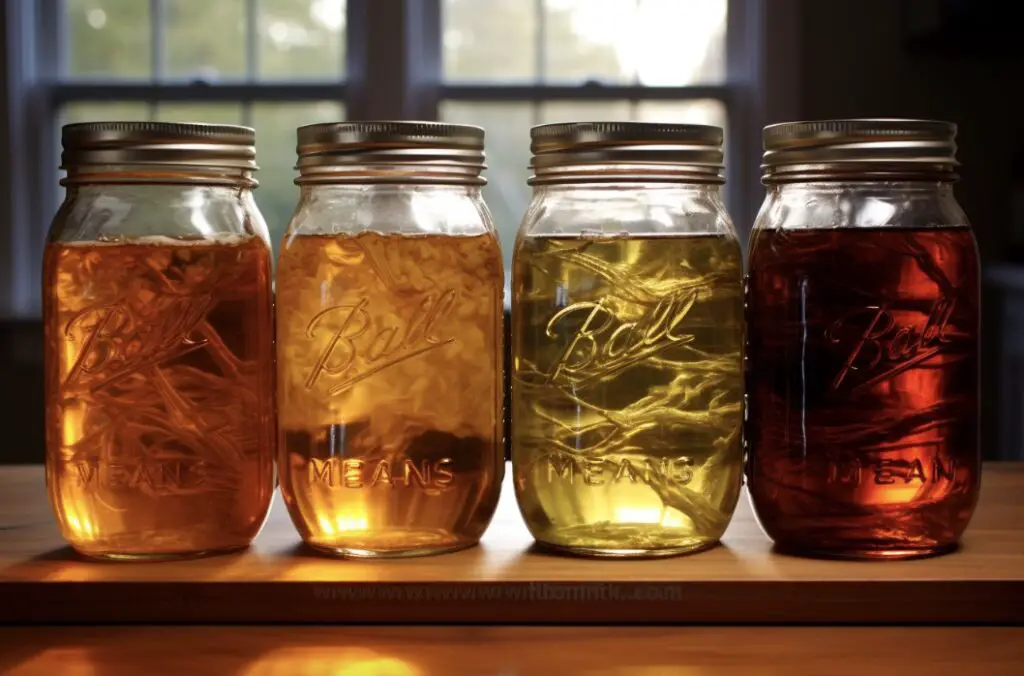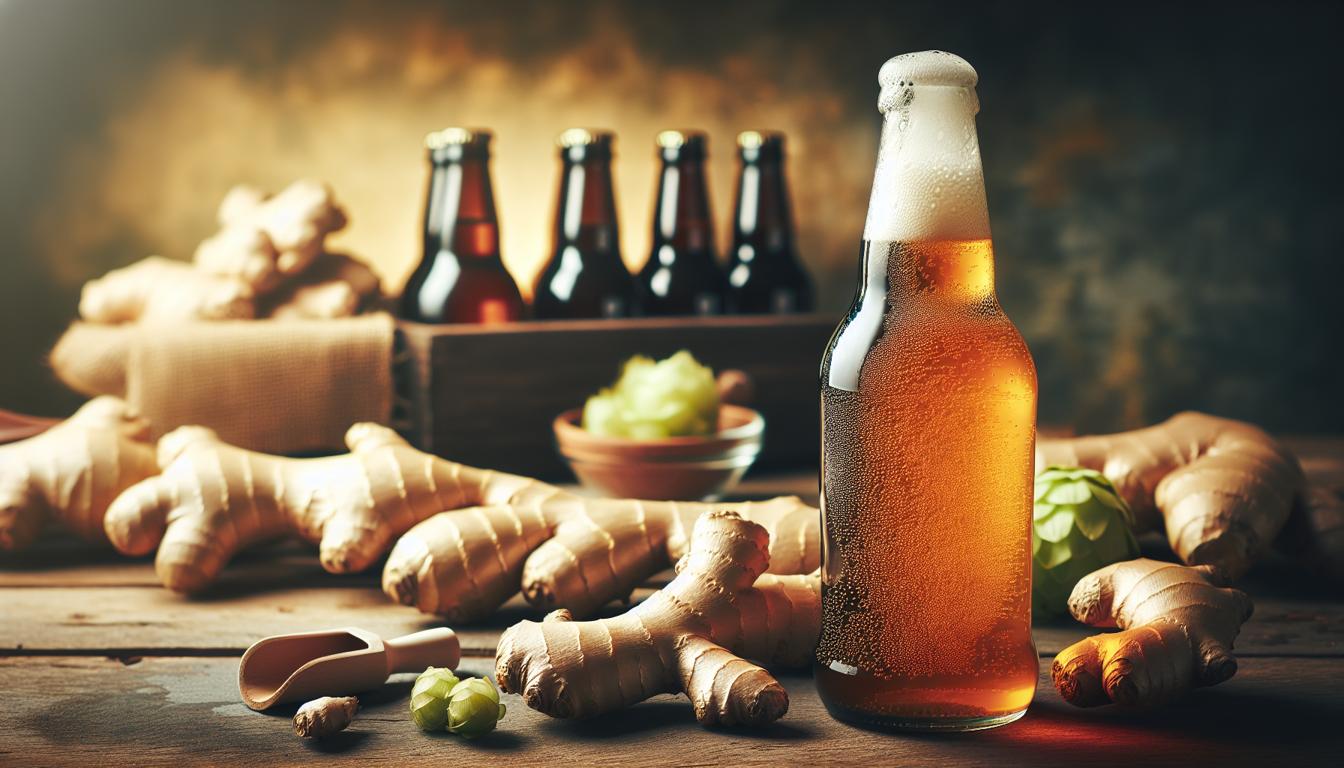Kombucha has been around for centuries, and it is currently enjoying a surge in popularity. The fizzy, fermented tea is touted for its probiotic benefits and unique flavor.
As a home brewer, I’ve spent countless hours perfecting my kombucha recipe and experimenting with various fermentation methods.
One question that often comes up when discussing kombucha brewing is whether or not you can ferment kombucha in mason jars. In this blog post, I’ll explore this topic in depth, sharing my own experiences and providing helpful tips for those interested in trying this approach.
Yes, you can ferment kombucha in mason jars. It’s an accessible, affordable, and simple method for brewing kombucha at home.
However, there are some important considerations and precautions to take when using mason jars for fermentation.
Why Mason Jars?
Mason jars are a popular choice for many home fermentation projects, such as pickling vegetables and making yogurt. They are widely available, relatively inexpensive, and easy to clean and sterilize. Additionally, they come in a range of sizes, making them suitable for different batch volumes.
When it comes to kombucha, mason jars provide a few key benefits:
1.Wide mouth: The wide mouth of a mason jar makes it easy to add and remove the SCOBY (symbiotic culture of bacteria and yeast) and other ingredients during the brewing process.
2.Transparent glass: The clear glass allows you to monitor the fermentation progress, such as the growth of the SCOBY and the development of carbonation.
3.Airtight seal: Mason jars can be sealed with a lid and band, creating an airtight environment that helps to protect your kombucha from contamination.

Fermenting Kombucha in Mason Jars: Step by Step
1. Choose the Right Size
Mason jars come in a variety of sizes, so be sure to choose one that will accommodate the volume of kombucha you plan to brew. For a small batch, a quart-sized jar should suffice. For larger batches, consider using a half-gallon or gallon-sized jar.
2. Prepare the Jar
Before you begin, it’s crucial to clean and sterilize your mason jar. Wash the jar, lid, and band with warm, soapy water, and rinse thoroughly. To sterilize, you can either boil the jar for 10 minutes or place it in a 225°F oven for 15 minutes. Allow the jar to cool completely before proceeding.
3. Brew the Tea
Prepare your tea according to your preferred kombucha recipe. Generally, this involves steeping tea bags or loose-leaf tea in boiling water, adding sugar, and allowing the mixture to cool to room temperature.
4. Add the SCOBY
Once your tea has cooled, pour it into the mason jar, leaving enough headspace for the SCOBY and any additional liquid. Gently place the SCOBY into the jar, ensuring it is fully submerged in the tea.
5. Cover and Ferment
Instead of using the mason jar’s metal lid and band, cover the jar opening with a breathable cloth, such as a coffee filter or tightly woven dish towel. This allows the kombucha to breathe and release carbon dioxide during fermentation while keeping out contaminants. Secure the cloth with a rubber band or the metal band from the mason jar.
Place the jar in a warm, dark location, such as a pantry or cupboard, and allow the kombucha to ferment for 7-10 days or until it reaches your desired taste.
6. Flavor and Bottle!
Once your kombucha has fermented, it’s time to bottle and flavor it, if desired. Remove the SCOBY and reserve it for your next batch. Pour the kombucha into airtight bottles, leaving some headspace for additional carbonation.

You can add fruit, juice, or other flavorings at this stage. Seal the bottles and allow them to sit at room temperature for a few days to carbonate before refrigerating and enjoying.
Important Considerations When Using Mason Jars
While fermenting kombucha in mason jars is possible, there are a few important considerations to keep in mind:
1. Oxygen Flow
Kombucha fermentation is an aerobic process, meaning it requires oxygen. The wide mouth of a mason jar can provide adequate oxygen flow, but it’s crucial to use a breathable cloth cover rather than the jar’s metal lid.
2. Contamination Risk
Mason jars are not specifically designed for fermentation, so there is a slightly higher risk of contamination compared to using a purpose-built fermentation vessel. To minimize this risk, be sure to clean and sterilize your jar and any equipment thoroughly, and use a tight-weave cloth to cover the jar during fermentation.
3. Pressure Buildup
During fermentation, carbon dioxide is produced, which can cause pressure to build up inside the jar. While mason jars are generally sturdy, there is a small risk that the jar could crack or shatter if the pressure becomes too great. To reduce this risk, be sure to leave plenty of headspace when filling the jar and use a breathable cloth cover to allow gas to escape.
Alternatives to Mason Jars
If you’re concerned about the potential drawbacks of fermenting kombucha in mason jars, there are alternative fermentation vessels to consider. Purpose-built kombucha fermentation jars or crocks, as well as wide-mouth glass or food-grade plastic containers, can also be used for brewing kombucha.
Conclusion
In conclusion, yes, you can ferment kombucha in mason jars. However, it’s essential to be aware of the unique considerations and precautions associated with this approach. By following the steps outlined above and keeping the potential risks in mind, you can successfully brew delicious kombucha in mason jars.
Here are ten key facts about fermenting kombucha in mason jars:
1. Mason jars are an affordable and accessible option for home kombucha brewing.
2. The wide mouth of mason jars makes it easy to add and remove ingredients.
3. Clear glass allows for easy monitoring of fermentation progress.
4. An airtight seal can help protect kombucha from contamination.
5. Mason jars come in various sizes, accommodating different batch volumes.
6. Oxygen flow is crucial for successful kombucha fermentation.
7. There is a slightly higher risk of contamination when using mason jars.
8. Pressure buildup during fermentation can pose a small risk of jar breakage.
9. Alternatives to mason jars include purpose-built fermentation vessels and wide-mouth containers.
10. With proper precautions, mason jars can be a simple and effective method for fermenting kombucha.
FAQs
Can you carbonate kombucha in a Mason jar?
Yes, you can carbonate kombucha in a Mason jar. However, it is important to be cautious and use proper techniques to avoid explosions or other safety hazards. It is recommended to use airtight lids, leave enough headspace, and burp the jar regularly to release excess pressure.
Can I use mason jars for second fermentation kombucha?
Yes, mason jars can be used for second fermentation of kombucha. However, it is important to make sure that the jars are clean and sterilized before use to prevent contamination. Additionally, it is recommended to use jars with tight-fitting lids to prevent air from entering and to allow for carbonation to build up.
Can you use mason jars to store kombucha?
Yes, mason jars can be used to store kombucha. However, it is important to make sure that the jars are properly sterilized before use and that the lids are secured tightly to prevent contamination. Additionally, it is recommended to use jars with a capacity of at least 16 ounces to allow for proper fermentation and carbonation of the kombucha.
Are ball mason jars fermentation grade?
Yes, Ball Mason jars are fermentation grade. They are made of high-quality glass and have airtight seals that make them suitable for fermenting foods and beverages.
What is the best container for second fermentation kombucha?
The best container for second fermentation kombucha is airtight glass bottles with flip-top lids or plastic bottles designed for carbonated beverages, as they allow for carbonation to build up and can withstand the pressure.
What can I use to carbonate kombucha?
You can use a combination of sugar and a carbonation method such as adding carbonation drops or using a carbonation machine to carbonate kombucha.




